PATH: HOME, GLOSSARY, WEBSITE INDEX, WEBSITE CONTENTS » ∨
∧ DO-IT-YOURSELF » DIY Boat Building & Repair, DIY Boat Inspections, DIY Schools & Classes »
∧ MEDIA w/Creator Directory » Product Documentation, Books, Magazines, Videos, Websites »
PAGE CONTENTS: (click ⇒ to go to each section on this page)
⇒ Topic Treatment: Introduction, Overview, Background, Details, Directories,+.
⇒ ^ Related Resources: EAB Topics w/Directories, Vendors, Products: Media: Books, Websites,+.
⇒ Visit EAB's FEATURED ARTICLES Home Page to preview the vast scope of our website.
⇒ This Month's Top 20 Most Popular Articles on our EAB website.
⇒ Layout of the EverythingAboutBoats.org Website's Pages: Page Types, Contents, Topics,+.
⇒ What our nonprofit Anchors Aweigh Academy and its EAB website have accomplished.
⇒ Members must SIGN IN to gain access to Members Only areas of this website.
⇒ Become an Academy Member and gain access to additional pages and programs!
⇒ Comments: Submit To ⇒ Comments♥EverythingAboutBoats.org (Replace "♥" with "@").
Marinas
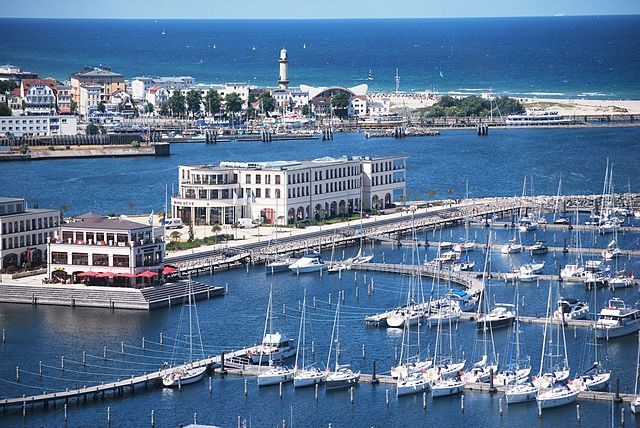 Boats of every type and size are docked at marinas around the world.
Boats of every type and size are docked at marinas around the world.
Many recreation watercraft from kayaks up to yachts and commercial craft, including fishing boats, are kept in marinas. Marinas provide safe harbor and many amenities that make boating more enjoyable including docks with moorings, restrooms, sewage pump-outs, fuel, water, power, and eateries. Some marinas have resident yacht clubs that offer their docks to members. When away from their home club, members can stay at reciprocating yacht club facilities.
Where you keep your boat depends on several factors:
Boat type.
Boat size. (trailerable, under 8½', or over 10' Beam.
Climate, Season. Hurricanes.
In-water "Wet". Fresh water. Salt water − Corrosion. Freezing − Ice.
Out-of-the-water "Dry".
Choices: (Type, Location. Pros & Cons.) (Ease of Access for Boating, Maintenance.+)
Covered or Uncovered.
On trailer, own yard, carport, garage,+. Storage Yard.
Boat Storage - Which method is best for you from Discover Boating.
While many people view boat storage as a way to protect their boat for the winter, savvy boaters see it as a way to keep the boat action-ready for the next outing — whether that outing occurs next weekend or next spring. Either way, your choice of storage method is important — it can affect domestic bliss, neighbor relations and, long term, the resale of value of your boat. You want secure storage but don’t forget: The easier it is to get your boat out of storage, the more often you’ll use it. Here, we help you weigh your options.
Outdoor Storage
Many boats spend their off hours and down months outdoors. Proper shrink-wrapping — meaning it’s both water-repellent and vented to allow moist air to escape — makes this a viable option. Owners who use tarps and ropes until their vessel looks like a rolled roast? They’re asking for a mildewy mess.
If the boat is parked open to the elements, cover upholstery to protect it from sun and weather. Beware of drains becoming plugged by leaves or other debris: a rain-filled boat can sustain structural damage, and its trailer can suffer blown tires and broken springs. Some boaters hedge this bet by erecting an awninglike cover over their boat.
Indoor Storage
Storing your boat indoors is great. The boat is protected from both sun and foul weather, either of which can age it, and it’s out of the prying eyesight of thieves or vandals. Plus, the setting might be a handy spot when you want to work on the boat.
Drawback? Indoor storage can be inflexible, unless you have a multiple-vehicle garage or pole barn or can convince your spouse the boat should be in the garage and the car parked outdoors. Make sure you’ll be able to retrieve it early if you want to get a jump on the next boating season.
Storage Unit
A commercial storage facility can offer either indoor or outdoor storage, and is a great option for those who, because they live in apartments or for reasons marital or legal, can’t keep a boat at home.
A yearly lease provides the boat a home for both on- and off-seasons. You’re generally welcome to work on the boat, but check for electricity and restrictions up front. Security is usually good. An extra advantage? Many storage facilities are in high-traffic areas.
Dry-Stack Storage
It’s hard to beat dry-stack storage, because your boat is shelved away from weather, water and other things that can cause woe. Dry-stack storage takes two forms. At marinas, your boat is raised by a high-capacity forklift and stashed on a boat rack in a covered (sometimes heated) building, ready for quick retrieval when you want to go afloat — often within an hour of your call. The cost is generally competitive with a wet-slip lease, and your boat stays cleaner than if slipped or towed. Other dry-stack storage facilities are seasonal and are focused more on storage than on quick access.
Resources:
Boat Storage Options Explained & Common Questions at Tom George Yacht Group.
Anchorages
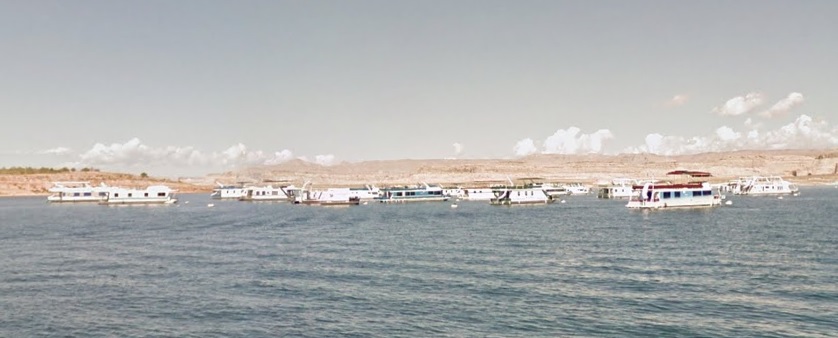 Houseboat anchorage near the Utah-Arizona border on Lake Powel
Houseboat anchorage near the Utah-Arizona border on Lake Powel
Many countries have established designated areas with specific boundaries where vessels may be anchored. Special rules apply to those anchored within these areas and to anyone nearby to increase safety and security. Permanent anchors with buoys are sometimes provided. Many require permission with some charging fees. At the other end of the spectrum, anchorages may be totally uncontrolled with no rules, facilities or amenities where anchoring is at your own risk. Moving people, supplies, etc. to and from the vessel is often via tender. Cruising guides often give details about anchorages, both controlled and uncontrolled. Such a guide is the Best Anchorages of the Inside Passage by Anne Vipond and William Kelly which is available to Academy Members to view from our Academy eLibrary.
Yards, Racks & Stacks
 Boats stored in the yard on foam blocks and launched using large fork lifts
Boats stored in the yard on foam blocks and launched using large fork lifts
at Dagmar's Marina in Everett, Washington.
Boats are often kept in boat yards, large and small. They may be on trailers, blocks, jack stands, cradles, or on racks, or on stacks.
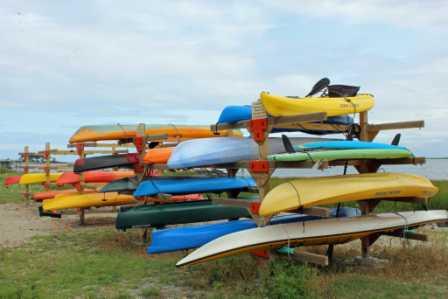 Kayak racks at Calf Pasture Beach, Norwalk, Connecticut.
Kayak racks at Calf Pasture Beach, Norwalk, Connecticut.
A rack that holds a single vessel is usually referred to as a "cradle". A rack often supports several vessels. Racks that pigeonhole many boats are usually referred to as "Stacks".
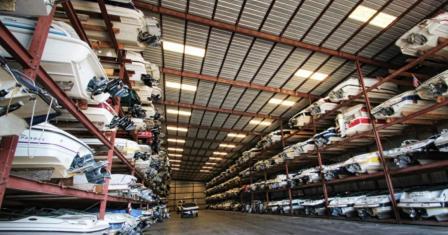
Stacks may be covered by a roof or inside a building as shown above, or uncovered as shown below. Boat Stacks allow many more boats to be stored on a smaller parcel of land, however they have sustained far more vessel damage in the event of a fire. Covered stacks help protect the boats from the elements, however they have often sustained even more damage in the event of a fire. Boats housed in Stacks that are equipped with fire sprinklers usually sustain much less damage from a fire.
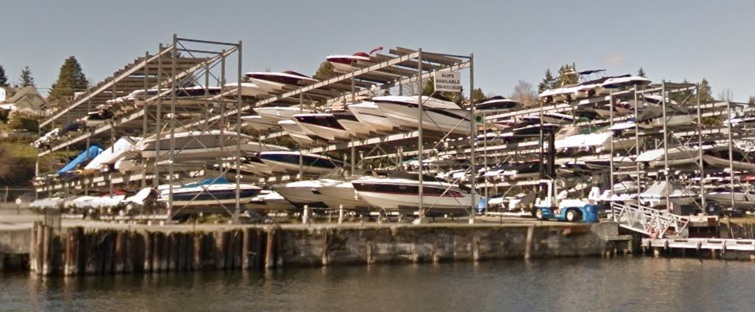 Boat Stacks on Lake Union in Seattle, Washington.
Boat Stacks on Lake Union in Seattle, Washington.
Special-built heavy-duty high-lift fork lifts are used to launch and retrieve boats as shown above.
Outdoor storage exposes the boats to the elements, so they are often shrink-wrapped during the off-season.
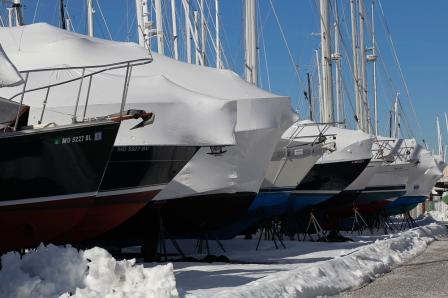 A yard full of shrink-wrapped boats enduring winter storage.
A yard full of shrink-wrapped boats enduring winter storage.
Boat Storage: What's Right for Your Boat?
There may be more boat storage options this winter than you realize—be sure to do your research before making your final decision. By Lenny Rudow November 18, 2020
"I got into boating with a trailerable boat (see our Boat Towing Guide if this is of interest to you), but over the years I moved up to boats too large for trailering, which meant winter boat storage became a necessity. Although I enjoy today's big boats, I sometimes miss the advantages of trailerable boats. There are a number of benefits to having your boat stored outside your back door. You can make snap decisions to head off on impromptu boating adventures at the drop of a hat, take advantage of those warm winter days to work on small projects, and you can even save money by keeping your boat on a trailer. But with larger boats, that simply isn't an option."
Winter boat storage of boats too big to trailer isn’t practical at your own home, so it’s important to find a safe winter spot that’s also affordable.
BOAT HAULING
To store a large boat at home, unless you live right next to a marina you'd have to arrange with a professional boat hauling company to move your boat to your house. That bill could well be several times the cost of hauling, winter storage and launching at a boatyard. Then in the spring, you'll have to pay for the hauling service all over again to get the boat to the water. Think more dollar signs.
Another consideration is local zoning. The city or town in which you live may not allow big boats to be stored on residential lots. The advantages of having your boat at home certainly aren't worth an expensive court fight. But if the law allows and you’re dead-set on keeping your boat at home, check out Winter Storage: Bringing the Boat Home, which explores some ways to make it happen.
Still, for most people living in northern climates, the annual winter layup is a fact of life. Back in the 50s and 60s, this always meant dry land storage in an open boatyard. Today, however, you have a couple more choices.
OUTDOOR BOAT STORAGE
Traditional outdoor storage is still the most popular method. It’s also the only possible way to store sailboats with their masts up. But the real reason for its popularity is cost. Blocking a boat on an empty lot is the least expensive method of winter storage both for the boatyard and the owner.
There are advantages to outdoor storage. For one, at most yards you are free to visit or work on your boat virtually anytime you choose. You can inspect the boat from the warmth of your car, providing an excellent reason for a weekend drive during the cold winter months.
There are also disadvantages. Obviously, the boat is subject to the elements. Covering your boat can expensive, (read How to Cover Your Boat to learn how to do the job yourself) and supporting frameworks can be difficult to erect. Even under cover, the boat always gets dirty outside. And boats stored outside can become the target of vandals. The best protection is paying a pro to shrink wrap a boat, but it's worth considering a few other options before defaulting to outside dry storage.
Shrink wrapping a boat is a good way to cover it for outdoor storage.
WINTER IN THE WATER
Year-round in the water winter boat storage is now possible in many harbors. Bubblers and propeller de-icers can protect a boat from winter ice damage. Both systems work by bringing relatively warm (that is, below freezing temperature) water up from the bottom to replace the cold water at the surface. The cost of de-icing makes it practical only for relatively large individual boats or whole harbors. You need enough depth that bottom water is warm enough to prevent surface ice buildup. And you must be in an area that’s not subject to moving ice floes.
It is possible to keep a boat in the water right through the winter, as long as you take the proper precautions.
STORE ON A BOAT LIFT
Boat owners who have their own pier usually will store their boats right in the same lift the boat sits in all summer. This used to be fraught with problems: you had to completely winterize and cover the boat yourself, and you had to do it while perched over the water on the side away from the dock. In recent years, however, this has been made much easier by the proliferation of mobile services. Today, many boat mechanics will travel to your home to handle the winterization job. And there are plenty of mobile shrink wrapping services, too. They bring small floats or dinghies with them, which they use to work on the far side of the boat.
An added perk to storing your boat on a lift for the winter is the ability to constantly monitor it, and even work on it through the winter. If you plan to do so, however, remember to ask the shrink wrap installer to put a zipper door in the cover. They don’t always do so, and there’s often a slight up-charge to have a door added.
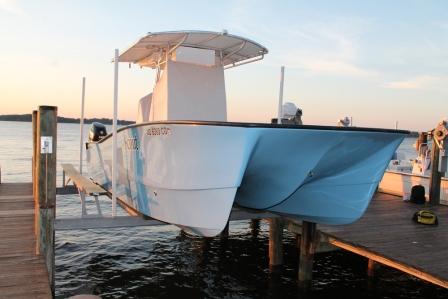
If you have your own pier with a lift, storing your boat at home is an easy call.
INDOOR BOAT STORAGE
Storing boats in large buildings is also very popular. If you're considering inside storage, pick a place that has good security. The building should be locked when boats aren't actually being moved in or out. No one should be allowed inside the building without a yard employee. Avoid storage buildings that allow owners to work on their boats inside. Nearly all boat storage building fires (which are inevitably disastrous) are started by careless owners working on their boats.
Of course, that means you won't even be able to see your boat all winter long, so working on any projects will be impossible unless you remove them from the boat and take them home before the building doors clang shut. That’s a real disadvantage, especially considering the expense of storing indoors.
But there are offsetting considerations. For one, your boat is protected from the weather without the work and/or expense of erecting a cover. Boats stored inside generally need less cleanup in the spring to restore that yacht-like appearance. Another advantage of locked buildings is that they offer good protection against vandals.
BOAT HAUL-OUT DAY
Plan to take a vacation day for haul-out so you're not rushed; sometimes the yard will get behind schedule. Be at the yard right at opening time – bringing a bag of fresh donuts for the crew is a great inducement to get your boat done quickly and done right. Rig bow and stern dock lines on both sides of the boat, as well as fenders if you'll be hauling out from a travel lift.
If you're having the yard winterize the boat, make sure access is easy. Nothing makes a mechanic more upset than being forced to move a couple of sleeping bags, a teddy bear, and three deck chairs to get at the job. If you plan to prep the boat for its long winter slumber on your own, then read our How to Winterize a Boat guide to make sure the job gets done right.
Before turning your boat over to the yard for winterization, be sure it’s cleaned up and easy to access necessary areas like the engine room.
Finally, when the travel lift or hydraulic trailer engine begins to rumble, step back and observe. Stay out of the way. Sure, it's natural for you to want to personally oversee the job but remember that the yard moves dozens or hundreds of boats every fall. You move one. They have a lot more hands-on experience than you do. So step back with a cup of coffee and one of those donuts, and enjoy the end of the season.
PLAN AHEAD
Whatever method of winter storage you plan to use, be the first on your dock to sign up. This doesn't mean you have to be the first one out of the water, but prompt action gives you the opportunity to select the exact date you want your boat hauled. It also insures you get the storage location you want.
If possible, schedule your haul-out on a weekday; on a weekend, the yard will likely have a number of skippers making demands, and yard employees naturally get a bit cranky. The pressure is off Monday through Friday, so yard workers are a lot more helpful.
For more information on winter boat storage, be sure to read:
- Winter Storage Tips for Outboard Motors.
- Winter Boat Storage Tips
- Five Winter Disasters: Don’t Let These Happen To Your Boat
- Boating Tips: Avoid this Outboard Winterizing Blunder
- Winter Boat Shore Storage Tips
And when that long winter ends and the snow has all melted away, take a peek at our Spring Commissioning for your Boat guide.
From Boats.com.
Boat Lift vendors:
Vehicle and Boat Storage Lift at BendPak.com.
Directory of EAB MOORAGE & STORAGE Subtopics
10 – BOAT MOORAGE & STORAGE:
10.01 – Moorage & Storage Builders: (Moorings, Marinas, Docks, Racks, Stacks, Lifts, Rails,+).
10.02 – Anchorages: (CAN, GBR, USA,+).
10.03 – Marinas: (CAN, GBR, USA,+).
10.04 – Yards, Racks & Stacks: (CAN, GBR, USA,+).
Related Resources:
Topic Pages w/Directories, Vendors, Products: Media: Books, Websites, etc.
Categorized by Topic & Hierarchy w/Links (Sitemap).
TABLE KEY: Resource Types are identified by the following Resource Codes (RC).
T = Topic Page.
TD = Topic Page w/Directory
V = Vendor Page.
VO = Vendor's Offerings.
VW = Vendor's Website.
MV = Media Vendor/Creator.
MS = Media Source.
P = Product Page.
PD = Product Documentation.
B = Book.
BB = Book - Biography.
BE = Book Excerpt.
BF = Book - Fiction.
M = Magazine.
MI = Magazine Issue.
MA = Magazine Article.
Vid = Video.
W = Website.
WA = Website Article.
WV = Website Video (incl. YouTube).
F = Forum.
FP = Forum Post.
S = Social Media.
SP = Social Media Post.
NOTES: Resource Codes are arranged above by resource directory hierarchy.
Resource Codes are displayed in the Right Column labeled "RC". ⇒ ⇒ ⇒ ⇒ ⇒ ⇒ ⇒ ⇒ ⇒ ⇓
Resource Codes which are BOLD indicate Media is available from our Academy eLibrary.⇒ ⇓
^ To view Media, Click on the Media Title to go to our webpage for that media and then:
^ ^ Scroll down to the Academy eLibrary section for media viewing instructions.
Resource Media (Books, Magazines, Videos, etc.) Titles are displayed in a smaller font.
Resource Titles below are arranged by hierarchy using "^" to show subordination.
Resource Links which are BOLD lead to EverythingAboutBoats.com ON-SITE pages.
Resource Links which are NOT BOLD lead OFF-SITE. We is not responsible for their content.
If a link fails or we should add a resource to this listing, please submit info via email to:
^ Editor♥EverythingAboutBoats.org (Replace "♥" with "@")
If any Related Resources should be added to this list, please submit info/links via email To:
Editor♥EverythingAboutBoats.org (Replace "♥" with "@")
NOT AN ACADEMY MEMBER?
CLICK HERE to discover how you can become a Member and gain FULL access to
thousands of expanded pages and dozens of excellent programs including our eLibrary!
CLICK HERE to view ALL the books, magazines, videos, etc. in our Academy eLibrary.
Media are also listed by category on the Topic Pages found on the Right Sidebar ⇒
CLICK HERE to donate any books, magazines, manuals, or videos, etc. to our Library.
EVERYTHING ON THIS PAGE OK?
If there is anything on this webpage that needs fixing, please let us know via email To:
Editor♥EverythingAboutBoats.org (Replace "♥" with "@")
THIS ARTICLE IS STILL EVOLVING!
The page may contain rough drafts that include raw source materials.

Visit our FEATURED ARTICLES Home Page
to see examples of our website's comprehensive contents!
Thanks to our amazing contributors for the steady flow of articles, and to our dedicated all-volunteer staff who sort, polish and format them, everyday we get a little bit closer to our goal of
Everything About Boats. If you would like to submit an article,
See Submitting Articles.
— TOP 20 MOST POPULAR ARTICLES —
Detroit Diesel 8.2 Liter “Fuel Pincher” V8 Engine
Cummins V-555 & VT-555 “Triple-Nickel” V8 Diesel Engine
Lehman 120 (6D380) Diesel Engine (Ford 2704C & 2715E)
Ford Industrial Power Products Diesel Engines
How to Identify Ford Diesel Engines
Ford 2715E Diesel Engine
Lehman Mfg. Co.
Perkins Engines
Universal Atomic 4
Sears Boat Motors: Motorgo, Waterwitch, Elgin, etc.
Chrysler & Force Outboards
Eska Outboard Motors
Allison Transmission
ZF Friedrichshafen AG
Marine Surveyors by Country
American Marine Ltd (Grand Banks)
Boat Inspection (Types of Marine Surveys)
Boat Builders: (A∼Z) (w/Vessel Types, Locale & Years Active)
USCG NVIC 07-95 Guidance on Inspection, Repair and Maintenance of Wooden Hulls
American Boat and Yacht Counsel (ABYC)
Layout of the EverythingAboutBoats.org Website's Pages
— Types of Webpages —
This website consists almost entirely of 3 types of webpages as follows:
- TOPIC PAGES (See Main Topic Pages listed on Website Contents or the Right Sidebar) ⇒
- EXAMPLE: – WEBSITE CONTENTS w/Links to MAIN TOPIC & Subtopic Pages:
- EXAMPLE: 02 – BOAT BUILDING, OUTFITTING, REFITTING & REPAIR:
- EXAMPLE: 02.06 – Boat Equipment:
- EXAMPLE: 02.06.08 – Propulsion Machinery:
- EXAMPLE: 02.06.08.01 – Engines w/Directory of Vendors.
- VENDOR PAGES (Vendors of Products, Services, Events,+, Destinations & Media Creators)
- EXAMPLE: 02.06.08.01 – ^ Ford Industrial Power Products Diesel Engines.
- PRODUCT PAGES (Equipment, Events, Media: pDoc, Books, Magazines, Videos, Websites,+)
- EXAMPLE: 02.06.08.01 – ^ ^ Ford 2715E Diesel Engine.
- EXAMPLE: 02.06.08.01 – ^ ^ Ford OpManual - 2710 Range Diesel Engines.
- EXAMPLE: 02.06.08.01 – ^ ^ Ford Service Manual - 2700 & 2710 Range Diesel Engines.
Clickable Links that lead to other webpages appear in Blue Text and usually open in a new window.
Links in the Right Sidebar and most directories open in the current window, not a new window.
Note in the examples above that these pages form a natural hierarchy.
The unnumbered "^" pages are listed alphabetically in most tables.
Media Titles in tables are distinguished by their smaller font size.
Media (Books, Magazines, Videos, Articles,+) are treated as Products.
Vendors' Product Documentation (pDoc) are considered Media.
Destinations & Media Creators are treated as Vendors.
All Website Pages are optimized for viewing on
full-width disktop computer monitors,
but can be viewed on phones.
— Contents of Webpages —
Website Pages typically contain the following Sections:
- PATH (Shows the chain of EAB pages w/links that lead to the page being viewed).
- EXAMPLE:
PATH: HOME, WEBSITE INDEX, WEBSITE CONTENTS » ∨
∧ BOAT BUILDING & REPAIR » Boat Equipment » Propulsion » Engines » ∨∨
∧∧ Ford, Ebro, American Diesel, AmMarine, Barr, Beta, Bomac, Bowman, Couach,
Lees, Lehman, Mermaid, Parsons, Renault, Sabre, Thornycroft, Wortham Blake »
∧ DO-IT-YOURSELF » DIY Boat Building & Repair » DIY Schools & Classes »
∧ MEDIA w/Creator Directory » Documentation, Books, Magazines, Videos, Websites » - (The "»" right pointing Guillemet symbol shows the chain through the page links.)
- (The "," comma between page links in the chain indicates pages are not subordinate, but are instead at the same level. See engine brands in the example above.)
- (The "∨", "∨∨", "∨∨∨",+ symbols indicate that the path line continues with whatever follows the "∧", "∧∧", "∧∧∧",+ symbols respectively. "∧" Precedes each MAIN TOPIC Page.)
- EXAMPLE:
- PAGE CONTENTS (Table of Contents with links to each main section on the page).
- PAGE BODY (The type of page determines the contents of its body as follows:).
- TOPIC PAGES (Topic Treatment: Introduction, Overview, Background, Details,+).
- (Many Topic Pages contain Directories of Vendors with Links).
- (Most Directory Listings are Alphabetical and/or by Locale).
- VENDOR PAGES (Vendor's Profile, Contact Information, Products, Services,+).
- (Manufacturers, Resellers, Refitters, Yards, Surveyors, Clubs, Schools, Authors,+).
- (Boating & Travel Destinations are treated as Vendors on their own Vendor Pages).
- PRODUCT PAGES (Product Features, Vendor Links, Specifications, Documentation,+).
- (Media created by a vendor is often treated as a Product on its own Product Page).
- (Boating & Travel Events are often treated as Products on their own Product Pages).
- TOPIC PAGES (Topic Treatment: Introduction, Overview, Background, Details,+).
- RELATED RESOURCES (Topics, Vendors, Products, Media: Books, Websites,+ with Links).
- PAGE TAIL Contains the following Anchors Aweigh Academy & EAB Website Features:
- The Anchors Aweigh Academy's EverythingAboutBoats.org Header.
- A link to our Featured Articles EAB Home Page.
- Top 20 Most Popular Articles. (The section that appears right above ⇑ this section).
- Layout of the EverythingAboutBoats.org Website's Pages. (This very section ⇐).
- Topics of Webpages. (The very next section below ⇓).
- What we have accomplished so far.
- Members must Sign-In to gain full access to Expanded Pages & Programs.
- Sign-Up (if not already a member).
- Public Comments (about the website & about this page).
- RIGHT SIDEBAR (Website Contents menu with links to Main Topic & Subtopic pages).
(On some smart phones, the Right Sidebar may appear at the bottom of the webpage)
— Topics of Webpages —
Website Pages are categorized under the following 16 MAIN TOPICS:
The MAIN TOPICS follow a natural progression from conception of the vessel thru its
building, marketing, survey, financing, insuring, transport, moorage, use and upkeep.
The MAIN TOPICS (all Caps) below are followed by their Main Subtopics with Links.
00 – HOME: CONTENTS, ABOUT EAB: Contact EAB, Abbreviations & Symbols, FAQ, GLOSSARY, ADs,+.
01 – ABOUT BOATS w/Museum Directory: Early History, Recent History, Modern Vessel Types,+.
02 – BOAT BUILDING, OUTFITTING, REFITTING & REPAIR: Materials, Equipment, Builders,+.
03 – BOAT MARKETING: Boat Shows, Dealers & Brokers, Importing & Exporting, Auctions & Sales,+.
04 – BOAT INSPECTION: Types of Marine Surveys, Marine Surveyors, Schools, DIY Inspections,+.
05 – BOAT TITLES & VESSEL REGISTRY: Boat Title & Registration, Vessel Registry, Title Co's,+.
06 – BOAT FINANCING: Conventional (Banks, Credit Unions,+), Unconventional (Creative),+.
07 – BOAT INSURANCE: Maritime & Recreational: Coverage, Carriers, Agents,+., Claim Processing,+.
08 – BOAT TRANSPORT: By Sea (Piggyback, Delivery Skippers & Crews, & Towing), Over-Land,+.
09 – BOAT HAULING & LAUNCHING: Drydocks, Ways, Lifts, Cranes & Hoists, Launch Ramps,+.
10 – BOAT MOORAGE & STORAGE: Builders, Anchorages, Marinas, Yards, Racks & Stacks,+.
11 – BOATING ORGANIZATIONS: Yacht Clubs & Sailing Clubs, Paddling Clubs, Boat Owners,+.
12 – BOATING & TRAVEL: Events, Destinations, Boat Rentals & Charters, Cruises, Voyages,+.
13 – BOATING & MARITIME EDUCATION: Recreational Seamanship, Ship's Master & Crew,+.
14 – MARINE LAWS & REGULATIONS: International & National Laws‚ Lawyers‚ Investigators‚+.
15 – DO-IT-YOURSELF: DIY Boat Building & Repair, DIY Boat Sales, DIY Boat Surveys, DIY Classes,+.
16 – MEDIA w/Creator Directory + Academy eLibrary: pDocs, Books, Magazines, Videos, Websites,+.
The above MAIN TOPICS and a more detailed listing of Subtopics
can be found on the Website Contents page and on the Right Sidebar.
An Alphabetical Index of the website can be accessed at Website Index.
What we have accomplished so far.
Anchors Aweigh Academy and its EverythingAboutBoats.org website.
- Published over 50,000 website pages about boats and boating, bringing us closer to reaching our goal of becoming "The ultimate reference resource about boats and ships for everyone from the beginning recreational boater to the seasoned professional mariner!"
- Published over 300 website main topic webpages, many with full articles on the topic. See our Website Contents or the Right Sidebar for the listing of the main topic pages.
- Published over 9,000 marine vendor webpages, all with their contact information, most with a description of their products and services, many with product documentation, specifications and independent reviews. (incl.: Boat designers, boat building tools, material and equipment manufacturers and suppliers, boat builders and dealers, yacht brokers, marine surveyors, boat insurers, boat transporters, skippers and crews, boatyards and marinas, yacht clubs, boat rentals and yacht charters, boating, seamanship and maritime schools, marine law attorneys and expert witnesses, boat refitters and repairers, book authors, magazine publishers, video producers, and website creators)
- Acquired over 120,000 pages of product documentation including Catalogs, Brochures, SpecSheets, Pictures, Serial Number Guides, Installation Manuals, OpManuals, Parts Catalogs, Parts Bulletins, Shop Manuals, Wiring Diagrams, Service Bulletins, and Recalls. And have made all viewable to Academy Members through our EAB website eLibrary.
- Acquired over 1,200 books and magazine back issues in our academy library and so far have made over 700 viewable to Academy Members through our EAB website eLibrary.
- Published over 500 DIY How-To articles about boat design, construction, inspection, operation, maintenance, troubleshooting and repair. We are working hard to do more.
We are currently formatting and polishing the Anchors Aweigh Academy online and hands-on courses. Our Marine Surveying course has proven to be excellent for both the beginner and the seasoned surveyor, and especially helpful to the Do-It-Yourselfer.
Current Academy Members must SIGN IN to gain FULL access to this
website including expanded pages and valuable Academy programs
like our Academy eLibrary and our Ask-An-Expert Program!
If your membership has expired, CLICK HERE to Renew.
IF YOU ARE NOT YET AN ANCHORS AWEIGH ACADEMY MEMBER,
CLICK HERE to discover how you can become a Member and gain FULL access to
thousands of expanded pages and articles, and dozens of excellent programs
WITH JUST A SMALL DONATION!
Comments for Public Viewing
Submit any comments for public viewing via email To: Comments♥EverthingAboutBoats.org (Replace "♥" with "@")
Please remember to put this webpage's title in the subject line of your email.
All comments are moderated before they appear on this page. See Comment Rules.
General Comments About the Website
FROM Donald: "This is an awesome website. I found the information that I needed right away from one of the over 20,000 free articles that you provide as a public service. I'm surprised that so much if this site is free. But I still signed up so I could access the thousands of expanded pages, interesting articles, and dozens of valuable programs! The member's library of books, magazines and videos that I can view online is really terrific! I understand that you and your staff are all unpaid volunteers. Please keep up the good work. And I commend you for your plans to add another 10,000 free informative articles over the next year. I'm thrilled to support you in this endeavor with my small membership donation. Thanks again for all your hard work."
FROM Huey: "I agree with my Uncle, I too have found the articles to be very enlightening. They say that it will take about 100,000 articles to cover the full scope that they have envisioned for the website. They have over 20,000 articles so far and that's doing pretty well, but it could take several years to get the rest. I also noticed that many of the Main Topic Pages and some of the article pages are still in the rough draft stage. I guess that they will fill in as they can get volunteers to work on them. But what I can't figure out is why anyone would spend the time writing informative in depth articles just to give away free to this website for publication? What's in it for them?"
FROM Dewey: "Well Huey, to me It looks like most of the articles on this website are written by very informed people, like boating instructors, boat designers, boat builders, riggers, electricians, fitters, marine repair technicians and marine surveyors. Writing such articles helps establish them as knowledgeable professionals. After all, this website was originally created by a school for marine technicians and marine surveyors. The website is growing in content every day. They even had to move to a bigger, more powerful server because the website's traffic has been growing exponentially."
FROM Louie: "I agree with everyone above. This site is quickly becoming the ultimate reference resource about every aspect of boats and ships for everyone from the beginning recreational boater to the seasoned professional mariner. I use the topic pages on the right sidebar to browse around the website. It's like a Junior Woodchucks' Guidebook for Boaters. Their Members' Library of over 300 popular and obscure books and over 200 magazine back issues that can be viewed online is fabulous. The Academy's magazine is especially informative. On top of that, there is the "Ask-An-Expert program for members where you can get an expert's answer to any of your boat questions. And a whole years membership is only $25. What a deal! I really love being part of this "Everything About Boats" community and help provide thousands of helpful articles free to the public. I think that I'll sit down right now and write an article about my experiences boating with my uncle."
FROM Scrooge: "You rave about this website like it was the best thing since sliced bread. Well, I think it stinks. Sure, it has a lot of good information for boaters, and they're adding more every day, but it will probably never be finished. Furthermore, I don't even own a boat. And I wouldn't have a boat even if someone gave me one. Boats are a waste of money and time and energy and money! They're just a hole in the water you pour money into. If you gave me a boat, I'd sell it quicker then you could say Baggywrinkle. Then I'd lock up the cash with all my other money so I could keep my eye on it and count it every day. Bah humbug."
FROM Daisy: "I'm just so glad that Donald got the boat so we and the boys could enjoy boating — together. And of course all of the girls, April, May, and June, love to be on the water too, especially when that is where the boys are. Oh poor Scrooge, boating is more fun then you could possibly imagine."
FROM Scrooge: "After seeing how much fun you all have on the water together, I regret that I didn't have that much fun when I was young. I've had a change of heart, and I'm giving each of you a Lifetime Academy Membership."
FROM Editor: "For those of you that have stayed with us this far, many thanks, and we hope that you found this little narrative informative. Your faithful support inspires us to keep working on this phenomenal website. We know that we have a lot more to do. Ultimately, we hope that we can help you enjoy the wonder filled world of boating as much as we do. We are all waiting to see what you have to say about this webpage article. Submit any comments via email To: Comments♥EverythingAboutBoats.org (Replace "♥" with "@"). Be sure to include this page's title in the subject line. Also, your corrections, updates, additions and suggestions are welcomed. Please submit them via email To: Editor♥EverythingAboutBoats.org (Replace "♥" with "@"). It has been truly amazing to see what we have been able to accomplished when we've worked together. Thanks to all those that have donated their valuable time and energy, and a special THANK YOU to all that have supported this cause with their membership donations."
Comments About This Particular Page
FROM ΞNameΞ: “Be_the_next_to_comment_about_this_page.” {230316}